In an era marked by incessant change and uncertainty, individuals often grapple with profound questions about existence, mortality, and connections that transcend the temporal realm. Among the myriad philosophies and religious doctrines that seek to elucidate these intricate themes, the Bahá’í teachings present a distinctive perspective on death, friendship, and the ephemeral nature of our existence—concepts that not only stir profound curiosity but resonate deeply with the human experience.
At the crux of Bahá’í philosophy lies the notion that death is not an endpoint but rather a transition. This outlook counters the prevalent societal fear surrounding mortality. Instead of perceiving death as a harbinger of despair, Bahá’í beliefs instill a sense of hope. The teachings assert that the soul is immortal and that earthly life is akin to a fleeting moment, a preliminary stage in an ongoing journey toward spiritual maturation. This understanding is fundamental and offers a comforting perspective amidst the inherent uncertainties of life.
Moreover, the contemplation of death serves to enrich our relationships, especially friendships. In recognizing the transient nature of our days, individuals are encouraged to forge deeper connections with one another. The Bahá’í teachings emphasize the importance of unity and love among all people, which underscores the significance of nurturing authentic friendships. The awareness of life’s fragility often motivates us to appreciate those we hold dear, prompting a reevaluation of priorities. In this light, the cultivation of genuine friendships becomes not only a source of joy but also a vital aspect of spiritual growth.
Throughout the Bahá’í writings, one finds the themes of love and friendship intertwined with the concept of life as a sacred gift. The Bahá’í Faith advocates for a communal approach to existence, where individuals see themselves as interconnected parts of a greater whole. This perspective fosters a spirit of cooperation and mutual support. The recognition that our time together is limited encourages us to engage with one another in meaningful ways, creating bonds that can withstand the tests of time and circumstance.
Furthermore, friendship within the Bahá’í framework transcends conventional boundaries. It is not merely an association based on shared interests or social circumstances; rather, it is envisaged as a bond that contributes to the spiritual elevation of both individuals involved. True friendship is characterized by selflessness, empathy, and a readiness to assist one another in their journeys. Such connections instil a fervent desire to help others attain their highest potential, thus reinforcing the Bahá’í principle of the oneness of humanity. In doing so, friendships become avenues for collective advancement and transformation.
In contemplating the profundity of our limited days, the Bahá’í teachings engender a mindfulness that compels us to live authentically. This mindfulness promotes a sense of purpose that permeates our interactions and decisions. The realization that time is ephemeral invites individuals to engage in acts of kindness, to express love openly, and to cultivate a lifestyle anchored in service to others. By prioritizing such values, individuals align their actions with the underlying principles of the Bahá’í Faith, thus setting the stage for a life filled with meaning and significance.
A striking feature of the Bahá’í approach to death is found in its emphasis on the continuity of life beyond the physical realm. The teachings elucidate the idea that the afterlife is not segregated from earthly experiences but is rather an extension of the soul’s evolution. This perspective provides solace to those grieving, affirming that the essence of the deceased continues to exist and progress in a spiritual context. Thus, friendships forged in this life remain relevant and influential, forming an invisible tapestry that weaves through both the material and spiritual realms.
Moreover, the Bahá’í teachings encourage individuals to embrace the concept of gratitude as a transformative force within the scope of friendships and experiences. By cultivating an attitude of thankfulness for the time shared with loved ones, individuals are prompted to reflect on the contributions those relationships make to their spiritual development. This practice fosters an appreciation for life’s intricacies and nuances, guiding individuals away from material concerns toward a more profound understanding of purpose and connection.
In essence, the teachings related to death, friendship, and the fleeting nature of life present a unique paradigm through which we may view our interactions and existence. By laying bare the interplay between mortality and connection, these teachings invite a re-examination of how we allocate our time and energy within our relationships. Embracing the ephemeral nature of our lives empowers individuals to live authentically, fostering friendships that are marked by depth and sincerity.
As individuals navigate the complexities of existence, an understanding of the Bahá’í perspective on these themes can be transformative. It encourages a shift in worldview—one that sees death not as a conclusion, but as a continuation; one that recognizes friendships as conduits for mutual enrichment and spiritual evolution. These principles challenge the superficiality often prevalent in contemporary society, urging a commitment to cultivate soulful connections that honor the sanctity of life and the oneness of humanity.
Ultimately, delving into the Bahá’í perspectives on death, friendship, and our handful of days compels individuals to engage with life more fully. It emphasizes the importance of nurturing relationships, embracing love, and understanding the intricate dance between earthly existence and the spiritual continuum. Through such engagement, individuals can experience the profound beauty of life, profoundly aware of the interconnectedness that binds all of humanity.
